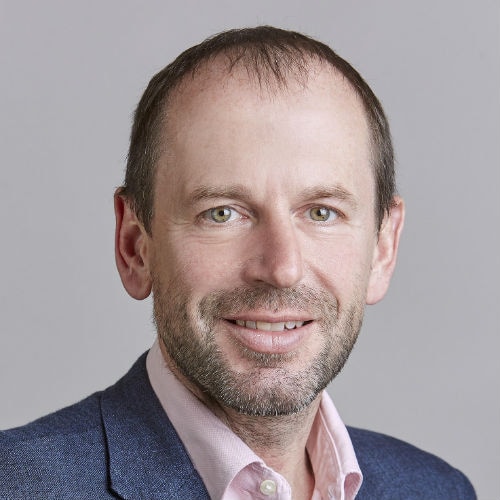In navigating these disruptions, companies want to be part of the long-term solution. The business community, along with governments, communities and civil society organisations, have an unprecedented opportunity to lead. Business leaders are focused on operating in a way that drives value for multiple stakeholders, and resetting corporate agendas with an eye towards long-term outcomes. These shifts are keys to sustained success for both business and society.
At PwC, we are strong believers in the power of companies to unite people in solving our toughest societal problems while also delivering value for their stakeholders. Now more than ever, many people expect businesses to be guided by a clear purpose, delivering value to society and diverse stakeholders.
Below, we share a range of ways that we have helped companies across the world be even greater forces for good in society, helping with challenges from cancer prevention to financial inclusion.
Case Studies
Case Study
Utilising tech innovation to empower cancer diagnostic advancements
One in two of us will get cancer one day, according to Cancer Research UK, and when we do, we are going to want to know the results of diagnostic tests as quickly as possible. That's why it was important for Sakura Finetek Europe to streamline the delivery systems of its cancer diagnosis products and consumables to healthcare laboratories and medical centres across Europe.
After tripling the number of its regional business units to 15 in the space of a decade, Sakura Finetek Europe was left with a network of legacy systems which were manual labour intensive, causing delays to deliveries.
The company needed to streamline its internal processes, so it asked PwC Europe to help redesign its process framework and support the roll-out to all European countries. PwC Europe helped Sakura Finetek Europe to implement systems and applications from Oracle Cloud, a PwC alliance partner, configure all modules, develop interfaces, reports and project management, and develop change management and training services.
The impact for Sakura Finetek Europe has been immense. In addition to facilitating more agile delivery of instruments and solutions to pathology laboratories, implementing Oracle Cloud Applications has enabled Sakura Finetek Europe to standardise internal workflows and simplify its business processes, as well as centralise solution data and customer information and enable more accurate data entry. The benefits to people with cancer could be significant, providing them with prompt diagnosis and thereby reducing stress and uncertainty.

Zaheer Bokhari
Consulting, Senior Manager, PwC Netherlands
“No one wants to get cancer, but getting test results as quickly as possible can at least give patients time and space to make the best decisions for them. We are glad to have been able to support Sakura Finetek Europe in this endeavour.”
Case Study
Helping a non-profit provide affordable homeownership in underserved communities
Leveraging the combined power of people and technology can produce powerful results. One nonprofit housing organisation combined the skills of their volunteers and employees with Salesforce technology to drive their mission forwards.
Westside Future Fund is a nonprofit organisation focused on helping historic Atlanta, Georgia neighbourhoods achieve Dr. Martin Luther King Jr.’s vision of accessible and affordable home ownership for all. The organisation used Salesforce to manage housing applicant data and volunteer-staffed events, but found it challenging to adapt its Customer Relationship Management (CRM) technology over time and make it more functional for its everyday needs. Challenges included outdated application questions, duplicate data, manual processes overly dependent on email, and time-consuming reporting. Westside Future Fund urgently needed to improve the system to help the team work more efficiently and drive their mission forward.
With PwC US’s help, Westside Future Fund was able to build more efficient processes using Salesforce CRM in just 11 weeks. PwC US simultaneously upskilled Westside Future Fund’s people, creating a personalised training curriculum with live sessions which helped the Westside team develop skill sets and perform new technical tasks.
The improvements to the system and process mean that Westside Future Fund is now able to get more relevant responses from applicants and has significantly reduced manual touchpoints between applicants and staff to obtain information. This has cut the time spent on administrative paperwork, speeding the process of getting people into affordable home ownership.

John Ahmann
President & CEO, Westside Future Fund
“Our work with PwC helped address our main challenges and remediate risks to our system. Our team now spends more time helping applicants and less sifting through duplicate data.”
Case Study
Using data to improve hospitality’s response to human trafficking
It is a horrifying truth that there are more than 27 million human trafficking victims worldwide at any given time, according to the US Department of State. It is estimated that 75% of those victims come into contact with a hotel at some point while being trafficked, according to Human Trafficking Research.
Hotels rely on their staff to identify the warning signs of potential human trafficking, but increased guest automation has reduced guest contact with staff and therefore made it harder for staff to spot potential instances of trafficking.
Technology and data teams from PwC US built an early warning system that uses AI to identify the subtle signals of human trafficking, such as guests remaining inside a hotel room for days while declining visits from housekeeping, requesting specific rooms, or unusual entry or exit patterns. The system warns hotel staff and recommends actions to take.
The solution upgrades the current approach taken by the hospitality industry to fight against human trafficking by using data to enable targeted action. This project won PwC’s 2023 Solvers Challenge, a global competition to recognise the greatest impacts of PwC’s community of solvers.

Ali Abidi, Engagement Partner
Case Study
Developing a new digital payment tool to drive financial inclusion
A significant percentage of South Africa's people use cash for most or all transactions. Although the country has made great strides towards greater financial inclusion and digital enablement, many people remain financially excluded from the modern banking system by transacting solely in cash.
Recognising the need to broaden digital financial inclusion through payment modernisation initiatives, BankservAfrica, Africa's leading automated clearing house, asked PwC South Africa to facilitate a process whereby a new payment system was implemented in the country called PayShap. This tool (co-created by the banking industry, BankservAfrica, Payments Association of South Africa and PwC) enables instant proxy payments in more affordable and effective ways than other existing payment systems.
The real-time payment platform was developed by a multidisciplinary team over a period of four years to create an alternative to cash and modernise the payment landscape in the country. It was launched in March 2023 with two key stand-out features — an instant clearing feature, which enables consumers to instantly pay to another bank account using account details, and a proxy payment feature, which enables consumers to make a payment to a proxy called a ShapID without knowing the bank account details.
These convenient features, plus PayShap’s lower cost than existing alternative digital payment solutions, are encouraging more people to use modern digital banking. As a result, PayShap is fueling greater social and financial inclusion for millions of South Africans.

Roshan Moonsamy
Interim CEO BankservAfrica
“Many people are currently excluded from the financial system as they are unable to make and receive digital payments. We are very pleased to have been able to support this transformative step to bringing greater equality and inclusion to South Africa's payment system.”
Case Study
Working with a Shanghai company to unite overseas teams and build trust
Bright Food Group is a Shanghai-based food and beverages enterprise. Bright Food International (BFI), its Shanghai-based subsidiary which manages the Group’s global portfolio, wanted a people-led, technology-driven platform to help it surmount internal language, culture and communication barriers which had been exacerbated by the COVID-19 pandemic and associated lockdowns.
As a Chinese enterprise which had acquired foreign businesses, it faced the challenge of uniting diverse overseas management teams and workforces to achieve its goal to become one of the world’s leading global food and beverages companies.
In addition, Bright Food needed the platform to satisfy increasingly stringent requirements by China’s state assets regulator for large companies to ensure transparency throughout their foreign holdings.
Using a multidisciplinary team of professionals from across our global network, PwC China helped Bright Food develop a risk management and regulatory platform using agile cloud-based technologies to improve corporate trust and revamp Bright Food's governance, risk and compliance architecture. The platform enables faster risk monitoring and alerts across BFI’s diverse global portfolio, for example by eliminating many time-consuming manual reporting tasks, and by generating instant data and insights into current operations. Crucially, it also enables colleagues around the world to share their regional and industry perspectives with the parent group.
The platform has been successfully piloted on subsidiaries in Italy and Hong Kong and future phases have already been scheduled to connect more overseas subsidiaries.
“PwC’s new platform has created more transparency and trust throughout Bright Food International’s Hong Kong and overseas networks. The platform allows us to operate more effectively as one worldwide organisation with the same strategic goals.”
Case Study
Supporting the development of policies in the public interest
PwC helps to drive the development of a policy environment that supports companies in being forces for good in society, ultimately building public trust in both business and society.
This year, our global network played a pivotal role in supporting the development of a robust sustainability reporting ecosystem. We support rigorous sustainability reporting because it creates transparency and accountability. We did this by engaging constructively with various standard-setting bodies in the development of external standards in reporting, assurance and ethics that are high quality and meet the needs of stakeholders. A key element of our involvement included promoting the importance of sustainability assurance standards.
During the year, we also did considerable work as a member of the Net Zero Financial Service Providers Alliance (NZFSPA). We are proud of the role we play in this alliance which unites auditors and other financial service providers with the Glasgow Financial Alliance for Net Zero (GFANZ). As part of this membership, PwC has committed to measuring and tracking our progress against the NZFSPA commitments, particularly those relevant to planning and performing audits and in consideration of related guidance issued by standard-setters and regulators, including as they relate to climate-related matters. For further details of our activities related to NZFSPA, refer to our 2023 PwC Network Environment Report.

Gilly Lord
Global Leader for Public Policy and Regulation, PwC UK
“It is critically important for us to contribute to the development of good policy and regulation for the whole ecosystem. We believe that applying ourselves in these broader terms leads to better quality outcomes than focusing in a siloed way at a particular part of the ecosystem.”
Case Study
Helping the private equity industry drive sustainable investment
Many in the private equity industry would like to help to speed the world’s progress towards net zero through sustainability-conscious investing. A team of PwC climate specialists and sustainability strategists drawn principally from firms in the UK, US, Greece and China has been working with private equity firm CVC Capital Partners to develop one of the first and most ambitious net zero strategies in the private equity sector. The work has included initial quantification of carbon emissions across CVC’s global portfolio of companies, identifying the key strategic levers to reduce emissions while increasing value and defining CVC’s overall climate ambition.
PwC teams have helped CVC portfolio companies in EMEA, Americas and APAC to quantify the potential climate impact and sustainable value creation opportunities for their business models and products, develop market-leading sustainability strategies, and prepare for upcoming sustainability and climate regulations.
Our work with CVC and its portfolio companies demonstrates that aligning with net zero is not at odds with building valuable companies; it can be intrinsic to it.

Will Jackson-Moore
Global Sustainability Leader, PwC UK
“The private equity industry is uniquely positioned to deliver the dual goals of positive returns for both society and investors. We are proud to support them in making sustainability a core of their investment principles.”
Contact us

Sarah Brown
Director, Global Corporate Affairs and Communications, PwC United Kingdom
Tel: +44 7384 248 785

















